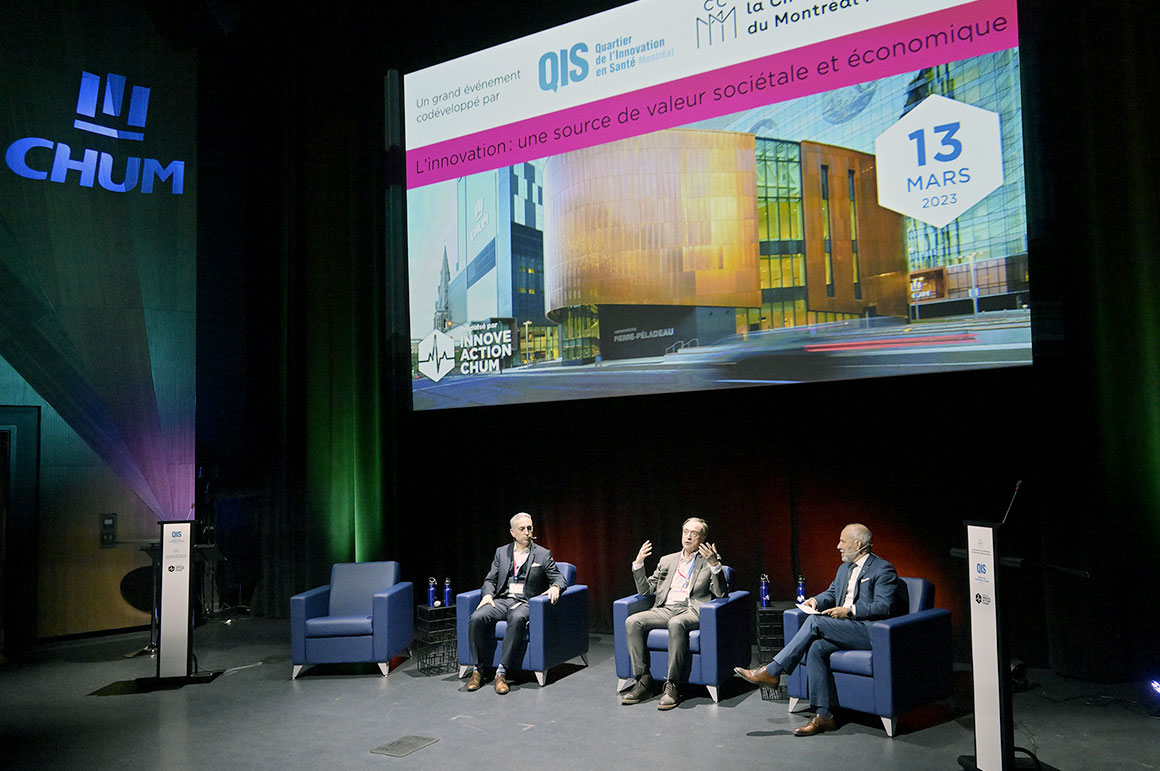On March 13, the Chamber and the Health Innovation District Montreal (HID Montreal) held a collaborative event on innovation in health. Powered by Innove-Action CHUM, it brought together close to 850 people, 90 panelists, as well as three representatives of the political world: the Honourable Steven Guilbeault, Member for Laurier‒Sainte-Marie and federal Minister of the Environment and Climate Change, Christian Dubé, Minister of Health, and Sonia Bélanger, Minister for Health and for Seniors.
This event offered a framework for reflection and discussion between businesses and actors in public health to strengthen synergies and find concrete solutions to modernize the current system. Here is a look at the highlights and findings from the day.
“We are on a trajectory where we want to go farther and faster in health. We need to find common ground where the public and private sectors agree. We have a duty to work together.” ‒ Michel Leblanc, President and CEO, Chamber of Commerce of Metropolitan Montreal

From left to right: Frédéric Abergel, President and CEO, CHUM; Fabrice Brunet, President and CEO, QIS et Michel Leblanc, President and CEO, The Chamber of Commerce of Metropolitan Montreal

Steven Guilbeault, minister of Environment and Climate Change

Carole Jabet, Scientific Director, Fonds de recherche du Québec – Santé and Luc Sirois, Chief Innovator of Quebec
Crédits : CHUM
 Previous
Previous  Next
Next
The importance of multidisciplinary collaborations
“The transformation of the health care system and the integration of innovations require the commitment of actors outside the network, including the public, municipalities, and community organizations.” ‒ Carole Jabet, Fonds de recherche du Québec
Interdisciplinary collaboration is critical to building a healthy future. There is currently a gap between ambitions and what is happening on the ground, so there is tremendous potential for innovation in health.
Despite this gap, many initiatives for multidisciplinary collaboration exist in the province and foster better integration of innovation in health to benefit patients. An example cited during the event is the OPAL project, an initiative of the McGill University Health Centre. This initiative offers patients with cancer the tools they need to better understand their condition and manage their movements and wait times. During the pandemic, it made it possible to limit waits in oncology rooms. The OPAL tool provides an overview of the patient’s path through the health care system.
Another initiative cited as an example of a successful collaboration is a project for a physician to evaluate the needs of seniors in a Québec City neighbourhood, conducted with the support of community organizations. This social geriatrics initiative is a form of social innovation.
The patient central to decisions
The day’s many discussions also pointed to the importance of basing efforts on the patient experience and needs. Often, they are the ones who make it possible to implement innovations in the health care system. Better synergy between the public and private sectors can help businesses understand those needs and find solutions with the public in a joint creation process.
Avenues for concrete solutions to improve the health care system
“The Quebec health care system requires process innovation, particularly given the labour shortage. Organizations that have reviewed their processes are doing better than their peers.” ‒ Christian Dubé, Minister of Health
Discussions point to the need for process innovation to ensure the transformation of the health care system. To accomplish this, we need to leverage intelligent automation rather than paper, which is still widely used in the sector. Automated processes offer a faster, more accurate snapshot of a situation and make it possible to react more promptly.
However, to achieve this aim, people on the ground need data and adequate training. Currently in Quebec, there are long delays to get conclusive data (up to two years). Data from other provinces is sometimes used as a stopgap.
That said, some specialists point out that we don’t need to reinvent the wheel to optimize the current system. We can draw inspiration from best practices around the world. For example, in Finland, thanks to data centralization and sharing software called Findata, access to timely information is facilitated for the entire network. There is no distinction between the private and the public sector.
In short, innovation is essential to modernize the health care system in Quebec. Better synergy between actors in the public and private sector, optimization of current processes and facilitated access to data for better visibility on hospital capacity are strategies to achieve this. The city is a perfect place to shape this transformation; it is a life sciences hub and a major centre for research and innovation. Let’s leverage our strengths to build a healthy, sustainable future.
About the event “Innovation: a source of social and economic value”
The event “Innovation: a source of social and economic value” was powered by Innove-Action CHUM and jointly developed by the Chamber of Commerce of Metropolitan Montreal and the Health Innovation District Montreal. It was produced in association with Accenture, AstraZeneca, Boehringer Ingelheim, MEDTEQ+, Novartis, and Novo Nordisk; in cooperation with the École de technologie supérieure, the Institut national de la recherche scientifique, IRICoR and Roche Canada; and in partnership with Hello, Hyatt Centric, Intuitive, IVADO, Lemay, Medicom, Minogue Medical, Novatek, Solution BI, Startup Montréal, and Université de Montréal. The event was made possible through the cooperation of the Government of Québec.
Discover our major spring events!
Topics in line with current events and the needs of our community: going green in business, transportation infrastructure, artificial intelligence, internationalization and major metropolitan projects.
See our next activities